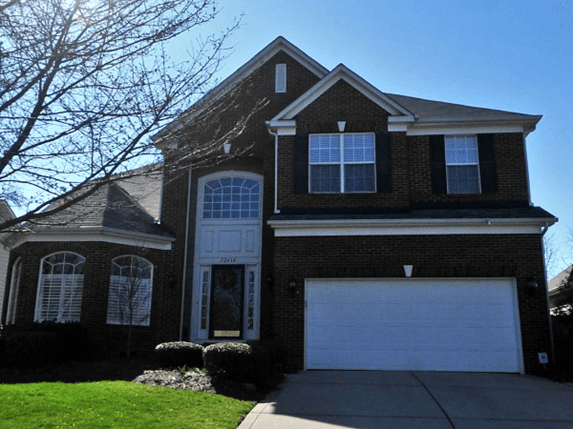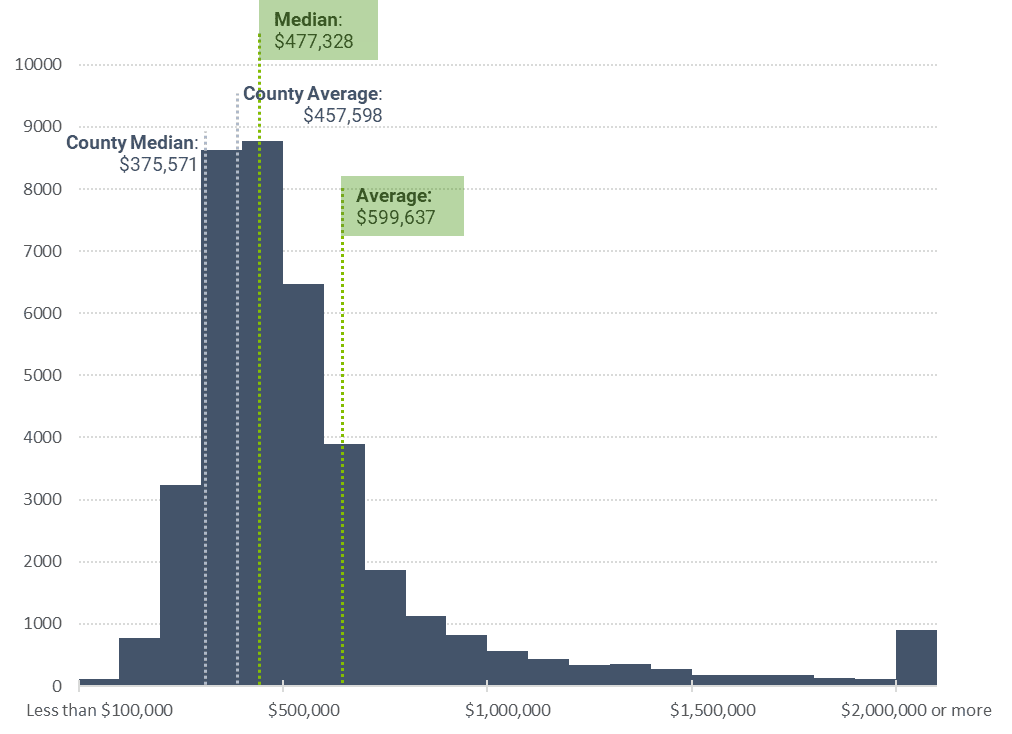2023 North Mecklenburg Housing Needs Assessment

By Katie Zager
Last December, the UNC Charlotte Urban Institute, along with the Lake Norman Economic Development Corporation, released the 2023 North Mecklenburg Housing Needs Assessment. This was an update to a report the institute previously released in 2019.
The assessment included information for the three towns that make up northern Mecklenburg County (North Mecklenburg); Cornelius, Davidson, and Huntersville. Here’s what we found:
Building is back. Yes, homes are being built, but overall housing stock still consists of larger, more expensive homes.
New residential construction has increased dramatically since 2010, when just 464 new residential units were permitted to be built. Twenty nineteen through 2021 saw decade highs, with over 2,600 units permitted in 2021. Most of those were for single-family homes. However, the number of permitted new-build units slowed some in 2022 and 2023. Over the past five years, half of the newly permitted units are located in Huntersville, with about a third of those slated to be multi-family housing. Those numbers are buoyed by two large senior living complexes coming to the market—Arden Senior Living and Symphony Park.

The existing housing stock in North Mecklenburg is primarily single-family. About 67% of homes are single-family detached, compared to 54% for Mecklenburg County as a whole.
Homes are also larger and newer than in Mecklenburg County as a whole. Over half of homes are less than 20 years old, and the median size is 2,378 square feet. Not only does this make them about 500 square feet larger than the median home in Mecklenburg, most also have 3 or 4 bedrooms.

This is what the average single-family home looks like in North Mecklenburg, where the median building year is 2002 and the median size is 2,378 square feet.
While the average size and age of homes have changed only slightly over the past five years, housing values have increased dramatically. Half of homes are now valued between $250,000 and $500,000.
Using 2023 Mecklenburg County Housing Assessment data, the median value of a home in North Mecklenburg is $477, 328. This is $100,000 dollars more than Mecklenburg County as a whole, where the median value is $375,571. The presence of very large, highly-valued homes in North Mecklenburg and along Lake Norman pulls the mean (average) up even higher.

Using the common standard that households should spend no more than a third of their income on housing, a household would need an income of about $160,000 to afford the median home in North Mecklenburg.
This makes it difficult for people who work in North Mecklenburg to live near their jobs
Among existing residents of North Mecklenburg, many of whom may have moved into their home years or decades ago, incomes are above the county average. Median household income ranges from $95,147 in Cornelius to $141,845 in Davidson, compared to $68,367 in Charlotte.
However, this is not the case for people who work in North Mecklenburg.
In 2020, 81% of the people who worked in North Mecklenburg lived elsewhere (mostly Charlotte) and commuted to the area for their jobs in major sectors such as retail trade, health care and social assistance, and professional services. About half of these workers (52%) make less than $40,000 a year. North Mecklenburg has a larger share of low-income workers than the county as a whole.
If home ownership is out of reach, workers turn to the rental market to find housing. As of March 2023, median rents in North Mecklenburg, and the county as a whole, were about the same. However, American Community Survey data shows that the county, Charlotte in particular, has more affordable units—about 22% of rentals were priced under $1,000 a month, compared to only 13% of units in North Mecklenburg. As we saw earlier, Charlotte also has a higher share of apartments (35% vs. 17%), meaning there are more options for renters across the income spectrum. When it comes to housing, availability is just as important as affordability.
This mismatch between the existing housing stock, and the types of jobs available, could contribute to the fact that workers are traveling longer distances. In 2020, 30% of people who work in North Mecklenburg commuted 25 miles or more to work, up from 19% in 2015.
The towns are taking action
When it comes to housing, the towns must contend with many of the same challenges as those faced by suburbs across the country. Ongoing challenges include the Not In My Backyard (NIMBY) phenomenon that accompanies almost any development, as well as the costs associated with the development and provision of housing – land, administration, regulations and zoning. Politically, the towns must also contend with challenges related to rapid growth, such as adequate sewer capacity or congested roads, and the perception that the higher-density housing needed to support a localized workforce will exacerbate these issues.
However, all three towns have made tremendous progress in the last five years, many taking advantage of funding from the American Rescue Plan Act to kickstart various affordability initiatives. Based on information provided in the 2019 report, Cornelius formed an affordable housing task force, which led to the creation of the Lake Norman Community Development Corporation, whose mission is to advance affordable housing in the region. Current activities include rental subsidies and an interest in transitional housing. Cornelius also allocated some funding toward implementation of the Smithville revitalization plan, a community-led initiative to both preserve existing affordable housing and support sustainable development in the neighborhood.
The Town of Davidson, which has long supported affordable housing in their town, has committed over $500,000 annually from the town budget to implement their affordable housing goals over the next decade. The initiative calls for educating the community and clients about affordable housing, creating new housing options, preserving existing housing, and making sure these efforts are adequately supported over time. Davidson has also been working on critical home repair to help preserve existing affordable housing.
Huntersville has also formed an affordable housing task force to review these issues. After months of meeting, members presented recommended actions to their town board last October. They concluded that the town should take action to provide support for affordable housing, protect existing stock, partner with other organizations and examine which policies support housing.
Compared to five years ago, housing affordability appears to be top-of-mind for many in North Mecklenburg – especially as high housing costs increasingly impact even middle-income folks, and as residents voice concerns about their own ability to live near their children, jobs, and communities. For those that value diversity in age, occupation, wealth, the economy and more, housing is clearly an issue that cannot be ignored.